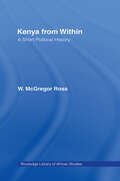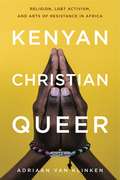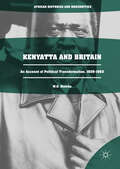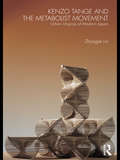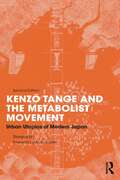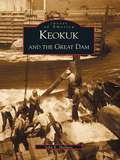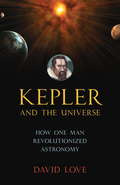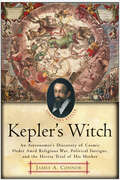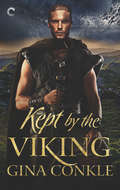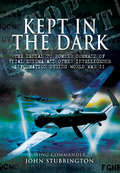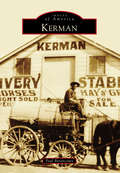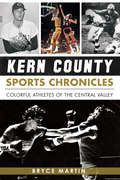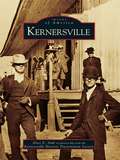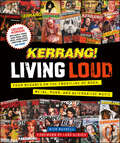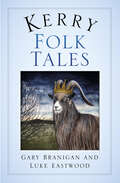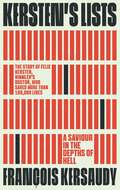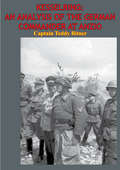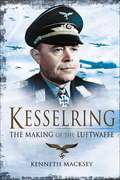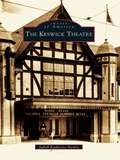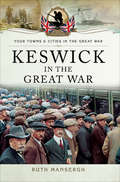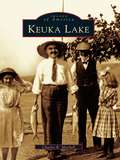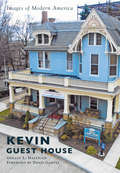- Table View
- List View
Kenyan, Christian, Queer: Religion, LGBT Activism, and Arts of Resistance in Africa (Africana Religions #3)
by Adriaan van KlinkenPopular narratives cite religion as the driving force behind homophobia in Africa, portraying Christianity and LGBT expression as incompatible. Without denying Christianity’s contribution to the stigma, discrimination, and exclusion of same-sex-attracted and gender-variant people on the continent, Adriaan van Klinken presents an alternative narrative, foregrounding the ways in which religion also appears as a critical site of LGBT activism.Taking up the notion of "arts of resistance," Kenyan, Christian, Queer presents four case studies of grassroots LGBT activism through artistic and creative expressions—including the literary and cultural work of Binyavanga Wainaina, the "Same Love" music video produced by gay gospel musician George Barasa, the Stories of Our Lives anthology project, and the LGBT-affirming Cosmopolitan Affirming Church. Through these case studies, Van Klinken demonstrates how Kenyan traditions, black African identities, and Christian beliefs and practices are being navigated, appropriated, and transformed in order to allow for queer Kenyan Christian imaginations.Transdisciplinary in scope and poignantly intimate in tone, Kenyan, Christian, Queer opens up critical avenues for rethinking the nature and future of the relationship between Christianity and queer activism in Kenya and elsewhere in Africa.
Kenyan, Christian, Queer: Religion, LGBT Activism, and Arts of Resistance in Africa (Africana Religions #3)
by Adriaan van KlinkenPopular narratives cite religion as the driving force behind homophobia in Africa, portraying Christianity and LGBT expression as incompatible. Without denying Christianity’s contribution to the stigma, discrimination, and exclusion of same-sex-attracted and gender-variant people on the continent, Adriaan van Klinken presents an alternative narrative, foregrounding the ways in which religion also appears as a critical site of LGBT activism.Taking up the notion of “arts of resistance,” Kenyan, Christian, Queer presents four case studies of grassroots LGBT activism through artistic and creative expressions—including the literary and cultural work of Binyavanga Wainaina, the “Same Love” music video produced by gay gospel musician George Barasa, the Stories of Our Lives anthology project, and the LGBT-affirming Cosmopolitan Affirming Church. Through these case studies, Van Klinken demonstrates how Kenyan traditions, black African identities, and Christian beliefs and practices are being navigated, appropriated, and transformed in order to allow for queer Kenyan Christian imaginations.Transdisciplinary in scope and poignantly intimate in tone, Kenyan, Christian, Queer opens up critical avenues for rethinking the nature and future of the relationship between Christianity and queer activism in Kenya and elsewhere in Africa.
Kenyatta and Britain: An Account of Political Transformation, 1929-1963 (African Histories and Modernities)
by W. O. MalobaThis book is the first systematic political history of Jomo Kenyatta, Kenya’s founding president. The first of two parts, it explores Kenyatta’s formative years in nationalist activism in Kenya and Britain, the complex links between colonial and British intelligence services and Kenyatta’s career and the political compromise he forged between Kenya and Britain. This book draws on primary sources to analyze this compromise, which marked his transformation from "leader to darkness and death" to the most beloved post-colonial African leader in the West.
Kenzo Tange and the Metabolist Movement: Urban Utopias of Modern Japan
by Zhongjie LinMetabolism, the Japanese architectural avant-garde movement of the 1960s, profoundly influenced contemporary architecture and urbanism. This book focuses on the Metabolists’ utopian concept of the city and investigates the design and political implications of their visionary planning in the postwar society. At the root of the group’s urban utopias was a particular biotechical notion of the city as an organic process. It stood in opposition to the Modernist view of city design and led to such radical design concepts as marine civilization and artificial terrains, which embodied the metabolists’ ideals of social change. Tracing the evolution of Metabolism from its inception at the 1960 World Design Conference to its spectacular swansong at the Osaka World Exposition in 1970, this book situates Metabolism in the context of Japan’s mass urban reconstruction, economic miracle, and socio-political reorientation. This new study will interest architectural and urban historians, architects and all those interested in avant-garde design and Japanese architecture.
Kenzo Tange and the Metabolist Movement: Urban Utopias of Modern Japan
by Zhongjie LinAmid Japan’s political turbulence in 1960, seven architects and designers founded Metabolism to propagate radical ideas of urbanism. Kenzō Tange’s Plan for Tokyo 1960 further celebrated urban expansion as organic processes and pushed city design to an unprecedented scale. Metabolists’ visionary schemes of the city gave birth to revolutionary design paradigms, which reinvented the discourse of modern Japanese architecture and propelled it through the years of Economic Miracle to a global prominence. Their utopian concepts, which often envisaged the sea and the sky as human habitats of the future, reflected fundamental issues of cultural transformation and addressed environmental crises of the postindustrial society. This new edition expands Zhongjie Lin’s pathbreaking account on Tange and Metabolism centered at the intersection of urbanism and utopianism. The thorough historical survey, from Metabolism’s inauguration at the 1960 World Design Conference to the apex of the movement at Expo ’70 and further to the recent demolition of Nakagin Capsule Tower, leads to a definition of three Metabolist urban paradigms – megastructure, group form, and ruins – which continue to inspire experiments in architecture, city design, and conservation. Kenzō Tange and the Metabolist Movement is a key book for architectural and urban historians, architects, and all those interested in avant-garde design, Japanese architecture, and contemporary urbanism.
Keokuk and the Great Dam
by John E. HallwasThis remarkable pictorial history tells the story of an engineering marvel: the first dam built across theMississippi River (from 1910-1913), and the historicMidwestern community that fostered the world-famoushydroelectric project. Keokuk and the Great Dam is the story of a colorful and historic river town with a dream of economic development and cultural progress; a self-taught engineer who took on a challenge that no one else wanted to attempt; and a massive construction effort that pitted men and machines against the awesome power of America's greatest river. Completed shortly before WWI, the Keokuk dam (now known as Lock and Dam No. 19) was the culmination of a long struggle to employ the Mississippi River for hydroelectric power and to improve navigation on the great waterway. In frontier days the Des Moines Rapids, stretching north from Keokuk, prevented loaded steamboats from moving upriver. They also created a business opportunity for local residents. A rapidly growing town by the 1850s, Keokuk went into decline for many years when it failed to secure adequate railroad connections. But the coming of hydroelectric powerfostered a new dream, and local leaders set out to harness the great river. What followed was a dramatic effort that drew international attention, produced the world's second largest dam (at the time), and forever changed both the community and the fabled American waterway.
Kepler and the Universe
by David K. LoveA contemporary of Galileo and a forerunner of Isaac Newton, Johannes Kepler (1571-1630) was a pioneering German scientist and a pivotal figure in the history of astronomy. This colorful, well-researched biography brings the man and his scientific discoveries to life, showing how his contributions were every bit as important as those of Copernicus, Galileo, and Newton. It was Kepler who first advocated the completely new concept of a physical force emanating from the sun that controls the motion of the planets--today we call this gravity and take it for granted. He also established that the orbits of the planets were elliptical in shape and not circular. And his three laws of planetary motion are still used by contemporary astronomers and space scientists. The author focuses not just on these and other momentous breakthroughs but also on Kepler's arduous life, punctuated by frequent tragedy and hardships. His first wife died young, and eight of the twelve children he fathered succumbed to disease in infancy or childhood. He was frequently caught up in the religious persecutions of the day. His mother narrowly escaped death when she was accused of being a witch.Intermingling historical and personal details of Kepler's life with lucid explanations of his scientific research, this book presents a sympathetic portrait of the man and underscores the critical importance of Kepler's discoveries in the history of astronomy.From the Hardcover edition.
Kepler's Witch: An Astronomer's Discovery of Cosmic Order Amid Religious War, Political Intrigue, and the Heresy Trial of His Mother
by James A. ConnorSet against the backdrop of the witchcraft trial of his mother, this lively biography of Johannes Kepler – 'the Protestant Galileo' and 16th century mathematician and astronomer – reveals the surprisingly spiritual nature of the quest of early modern science. In the style of Dava Sobel's Galileo's Daughter, Connor's book brings to life the tidal forces of Reformation, Counter–Reformation, and social upheaval. Johannes Kepler, who discovered the three basic laws of planetary motion, was persecuted for his support of the Copernican system. After a neighbour accused his mother of witchcraft, Kepler quit his post as the Imperial mathematician to defend her. James Connor tells Kepler's story as a pilgrimage, a spiritual journey into the modern world through war and disease and terrible injustice, a journey reflected in the evolution of Kepler's geometrical model of the cosmos into a musical model, harmony into greater harmony. The leitmotif of the witch trial adds a third dimension to Kepler's biography by setting his personal life within his own times. The acts of this trial, including Kepler's letters and the accounts of the witnesses, although published in their original German dialects, had never before been translated into English. Echoing some of Dava Sobel's work for Galileo's Daughter, Connor has translated the witch trial documents into English. With a great respect for the history of these times and the life of this man, Connor's accessible story illuminates the life of Kepler, the man of science, but also Kepler, a man of uncommon faith and vision.
Kept by the Viking (Forgotten Sons #1)
by Gina ConkleLoyalty to the Brotherhood comes before all. Including women. Formidable Viking leader Rurik knows the law. His loyalty to the Forgotten Sons is his bond, and no woman will threaten what he’s built from the ground up. But the Sons are a roving band of Vikings, and Rurik is growing restless—so when Normandy’s chieftain offers land, the proposal intrigues him. And the sultry Parisian thrall he finds in his tent intrigues him even more…Safira is cunning and clever and full of secrets. Rurik’s men have no interest in securing her safe passage home, but, piqued with lust, Rurik views Safira’s wiles as a captivating challenge—one he’s determined to conquer, even if lying with her is as defiant as it is inevitable.Traveling with Safira has been a fantasy come true—what started as lust is quickly turning to the kind of partnership Rurik could never have dreamed. But their arrival in foreign lands marks a new chapter, one that demands a Viking wife. With impossible decisions to be made, Rurik’s alliances are fraying, and past promises may not be enough to save him from having to betray those he’s sworn loyalty to—including Safira.This book is approximately 83,000 wordsOne-click with confidence. This title is part of the Carina Press Romance Promise: all the romance you’re looking for with an HEA/HFN. It’s a promise!Edited by Stephanie Doig
Kept in the Dark: The Denial to Bomber Command of Vital Enigma and Other Intelligence Information During World War II
by John StubbingtonThis fascinating historical revelation goes to the very heart of British and Allied Intelligence during World War II, specifically in the context of planning, control and implementation of the combined bomber offensive against Germany. There are sound arguments based on official archives that the handling of much air intelligence was faulty and reasons to believe that some departments within Whitehall were influenced by parochial and personal attitudes that interfered with the selection of strategic targets and the planning of the bombing offensives. In some departments within Whitehall and even the Air Ministry, there was a culpable failure to understand and appreciate the operational capabilities and limitations of the RAF and USAAF bomber forces. After the evacuation of the BEF the only means of destroying the Axis production of arms and munitions fell to the RAF and this was their prime objective for the rest of the war. The destruction of arms factories, power stations, air and ship production was the underlining objective, although when special targets, such as the break-outs of the German navy's major warships and U-Boats were deemed vital, the RAF were expected to react immediately. Much of Britain's intelligence was gathered from the German ENIGMA signals and became known as ULTRA with a security classification of MOST SECRET. Apart from the brilliant work at Bletchley Park there were other inputs from partisans throughout occupied Europe, Allied agents and various forms of reconnaissance. It was a new type of warfare that developed and improved as the war progressed but all too often the bomber squadrons were put into unnecessary peril through imprecise and unthinking demands from the highest levels of government.
Kerman (Images of America)
by Paul BetancourtKerman sits in the heart of California's great San Joaquin Valley. First established in 1891 as a train stop for the Southern Pacific Railroad, the town site was originally named Collis Station for the railroad's president, Collis P. Huntington. Even in its earliest days, agriculture was the driving force behind Kerman's economy. Advances in irrigation as well as Kerman's close proximity to two of the region's largest rivers--Kings and San Joaquin--resulted in abundant access to water, attracting farmers and land investors at the start of the 20th century. As the community grew, alfalfa hay, raisins, and dairy products became mainstays in Kerman's agricultural production. By 1910, Kerman had a volunteer fire department, a library, and new businesses. Images of America: Kerman explores the first 80 years of a town that continues to grow and diversify.
Kern County Sports Chronicles: Colorful Athletes of the Central Valley (Sports)
by Bryce MartinMoon Mullen was an integral member of George Halas's old Chicago Bears. Verl Lillywhite played on the mid-century San Francisco 49ers, integrating the pro football roommates' tradition by bunking with Joe "The Jet" Perry. Rodeo star Chuck Roberson doubled for John Wayne when the stunt work got dicey. Jay Carty played on the Los Angeles Lakers with Jerry West. George Culver tossed a no-hitter for the Cincinnati Reds. What these former athletes and others profiled in this collection have in common is Kern County, California, and the good fortune to have had Bryce Martin covering their careers. With decades of experience writing for top publications, former St. Louis Cardinals prospect Martin offers a collection of profiles that forms a veritable Kern County sports hall of fame.
Kernersville (Images of America)
by Kernersville Historic Preservation Society Alice E. SinkNative Americans first inhabited the eastern Forsyth County area, a natural watershed and source of six rivers and creeks. About 1756, Irishman Caleb Story settled here on 400 acres of wooded land. Years later, Story sold his land to David Morrow for a purported four gallons of rum. About 1771, William Dobson purchased the original acreage and additional tracts and built an inn near what is now Mountain Street and Main Street. He named this junction Dobson'sCrossroads. On June 2, 1791, President George Washington ate breakfast at Dobson's Tavern. On November 14, 1817, German-born Joseph Kerner (also spelled K¶rner) purchased the land and renamed the area Kerner's Crossroads. This begins the story of Kernersville. The same roads, still graced with historic churches, stores, and homes, crisscross at the heart of this community. K¶rner's Folly, which contains 22 rooms, housed the first private little theater in America.
Kerrang! Living Loud: Four Decades on the Frontline of Rock, Metal, Punk, and Alternative Music
by Kerrang! Nick RuskellRelive the greatest moments in the last 40 years of hardcore, punk, and metal with this incredible book by Kerrang!, alternative music&’s most trusted publication. Celebrate 40 years of Kerrang! with this year-by-year review of the greatest artists and moments in metal and alternative music. Kerrang! has an unparalleled reputation as one of the world's best-loved rock-focused publications. It continues to be at the forefront of alternative music, flying the flag for metal, hardcore, punk, and beyond, introducing millions to their new favorite bands. Anyone who&’s anyone in the metal scene has featured Kerrang&’s hallowed pages and this unique book chronicles these appearances. If it happened in metal, Kerrang! covered it, as confirmed in this year-by-year survey of alternative music. By highlighting the heaviest albums, the most outlandish stars, the rowdiest mosh pits and the most incredible moments in rock history, fans are going to love it
Kerry Folk Tales
by Gary Branigan Luke Eastwood Elena DanaanNamed after the peoples of Ciarraige who inhabited the ancient territory, Kerry possesses a rich tapestry of history, legend and folklore unparalleled by many others. In this book, authors Gary Branigan and Luke Eastwood narrate a variety of myths and fables that will take you on a journey through Kerry’s past. Many of the stories have been handed down by local people from generation to generation, and reveal old customs and beliefs filled with superstition, while others are more modern, showing the continuance of the Irish traditions of the seanachaí and of Irish storytelling.
Kersten's Lists: A Saviour in the Depths of Hell
by François KersaudyOskar Schindler is well known for having saved a thousand Jews from Nazi extermination during World War II. Yet Felix Kersten, Heinrich Himmler's personal physician, remains almost unknown to this day. Only Kersten was able to relieve the Reichsführer of his crippling and chronic abdominal pains. Though despising the Nazis, he continued to work for Himmler throughout the war, using his position to pass intelligence to Finland, Sweden and the Netherlands, and demanding as payment from Himmler the liberation of victims sentenced to imprisonment or death. Drawing on unseen archive material from Germany, Sweden, The Netherlands and Israel, François Kersaudy guides us in the footsteps of a man who exploited the politics of hatred and fear within the Third Reich to save the lives of over a hundred thousand people, including sixty thousand Jews.
Kerstmis in de armen van de hertog
by Amanda MarielLady Marina Ellis is te schande gemaakt en verraden door de mensen die ze het meest vertrouwde. Ze is bijna dood en heeft dringend behoefte aan redding. Evan Lockhart, had nooit verwacht een vrouw te vinden die buiten zijn hertogdom begraven ligt in een sneeuwbank, maar nu hij haar vindt, kan hij haar zijn rug niet toekeren. Als Kerstmis nadert vormen de twee een band, maar kunnen ze de obstakels tussen hen overwinnen en hun kans op liefde omarmen?
Kesselring: An Analysis of The German Commander at Anzio
by Captain Teddy BitnerThis study attempts to analyze the decisions made by Field Marshal Albert Kesselring prior to and during the battle of Anzio in February 1944. The focus of the investigation is on Kesselring's decision to shift Army Group reserves from the Rome area prior to the Allied amphibious assault at Anzio on 18 January 1944, then his involvement in the development and execution of the German counterattack against the Allied beachhead conducted on 16 February 1944.The investigation reveals that Kesselring, the Army Group Commander, made a proper and effective decision in committing the Army Group reserves to the German defensive line prior to the invasion, and that his involvement in the development and execution of the German counterattack at Anzio was doctrinally sound and generally effective.
Kesselring: The Making of the Luftwaffe (Greenhill Military Paperbacks Ser.)
by Kenneth MackseyIllustrated with maps and a center section of black and white photographs. Kesselring-commander, leader, administrator; the only senior German officer to start and finish the Second World War holding a high command appointment. There was scarcely a major campaign in which he was not at some time deeply involved: he flew in the forefront of the battle over Poland, Holland, Britain, Russia and the Western Desert and was shot down five times; as a field commander he defended Tunisia, Italy and, ultimately, Germany. But it is as much for his role in the formation and development of the Luftwaffe that Kesselring is remembered-his were many of the ideas, plans and insights about the part played by aircraft in the land battle. They were central to the careful, systematic reorganization and building up of the German military machine in the 1920s and 30s. This first complete biography presents the complex, fascinating personality of a man whose qualities of utter determination, charm and good humor, harnessed to outstanding training and experience, enabled him to cope with both victory and defeat and, finally, when placed on trial for his life, to face his judges with dignity, equanimity and a staunch defense.
Keswick Theatre, The (Images of America)
by Judith Katherine HerbstThe Keswick Theatre, located just outside Philadelphia, opened in 1928 in an era when four thousand similar structures were in various stages of design and construction across the country. Vaudeville was in its final days and film was just being born. Designed by acclaimed architect Horace Trumbauer, the theater evolved into the area's premier movie house. When the theater was threatened with demolition in the early 1980s, the Glenside Landmarks Society was formed with the hopes of restoring the building to its former grandeur. Today, operating as a commercial venture, it is one of the most acclaimed concert halls in the Philadelphia area. The Keswick Theatre celebrates this historic landmark through vintage images and recognizes the dedicated community members who have kept its doors open.
Keswick in the Great War (Your Towns & Cities in the Great War)
by Ruth ManserghKeswick in the Great War is an expert account of this Lake District market town's fascinating, yet largely forgotten, contribution to the Great War effort from the outbreak of war in 1914, to the long-awaited Allied victory in 1918.It charts the remarkable, and sometimes moving, stories of several heroic local figures, including Lord and Lady Rochdale, who converted their home into a VAD hospital; Caleb Barnes, a former headteacher of Braithwaite Primary School who was taken prisoner in Belgium; Catherine Elizabeth Marshall, supporter of The No-Conscription Fellowship, whose husband, the chairman of the NCF, was imprisoned in 1916; and Reverend Bettison, Curate of Crosthwaite, who was mobilised on 4 August 1914 and sent to Burma in October 1914. The book also acts as an accessible reference guide to local war memorials, such as The Fretwork War Shrine, as integrated throughout are rare wartime illustrations of these memorials and rolls of honour, like the recently discovered roll of honour found inside Underskiddaw Church Rooms.Overall, this is a poignant testimony to the momentous efforts, bravery, self-sacrifice and determination of the people of Keswick during the Great War, who sought to find normality in a reality so far removed from anything they had ever known.
Ketchikan: Alaska's Totemland
by Mary G. Balcombrief, but interesting, history of Ketchikan Alaska and it's surrounding area. Covers both the local indians and the white settlers.
Keuka Lake
by Charles R. MitchellNestled among the hills of western New York State is the beautiful lake Keuka, the Indian word for "canoe landing." Once visited, the loveliness and serenity of this particular lake in New York's Finger Lakes region draws people back. Visitors return to stay for a week or the summer, and tourists come back, often annually. Many who have lived or summered at the lake return to retire. Keuka Lake brings back the time period from 1850 to 1960, the era of black-and-white photography. Featured are the local grapes and wineries, the steamboats, the commercial activities on and around the lake, and the lake itself. Today, the boats are no longer steam powered and the wineries are more plentiful, but other aspects of life have not changed. The residents are hospitable; the pace is slow; the lake is resplendent and inviting.
Kevin Guest House (Images of Modern America)
by Gerald L. Halligan Denis GarveyWhile unknown to many living in western New York, the Kevin Guest House has served thousands of critically ill individuals and their families for over 40 years. Quietly nestled within the expanding Buffalo Niagara Medical Campus of Buffalo, New York, the demand for the facility continues to increase. The opening chapter is a testimony to the Speyser-Beer family, who originally owned the property. The second and third chapters memorialize the founders of the Kevin Guest House, the Garvey family of Sharon, Pennsylvania. The remaining chapters provide a virtual tour of the grounds and building expansions of 2016.
